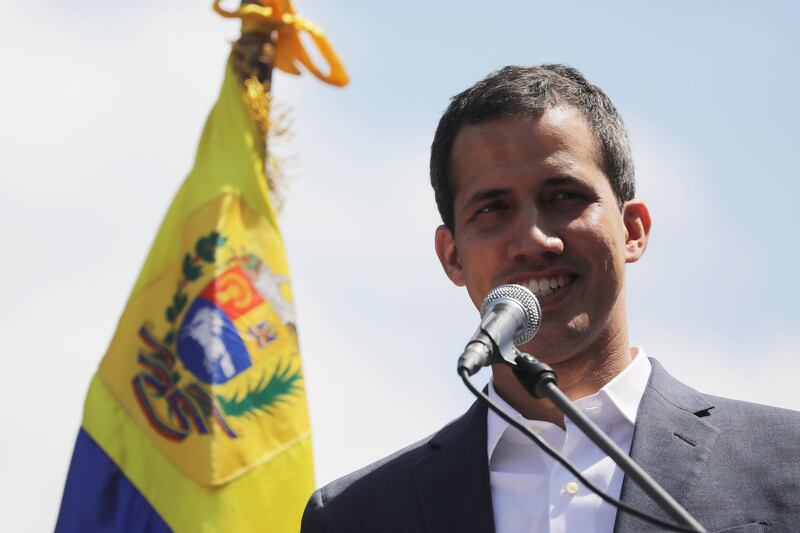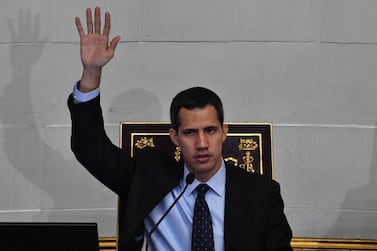Venezuela’s ambassador to Iraq has become the first diplomat to back the country’s opposition leader Juan Guaido as the legitimate president of the Latin American country as pressure continues to mount on incumbent Nicolas Maduro.
In a video message shared on social media on Saturday, Jonathan Velasco denounced Mr Maduro and pledged his support for Mr Guaido, who has been recognised by the United States as the legitimate leader of Venezuela.
“The National Assembly is the only power of the Republic which has ethics, legitimacy and legality,” Mr Ramirez said in his statement, referencing the body that Mr Guaido represents.
“We, diplomats based abroad, acting on behalf of the State, swear to defend the 1999 Constitution as a mandate from the original constituent power that had the support of almost the entire Venezuelan population,” he continued.
“Our place is next to the people, the Republic, the Constitution and the National Assembly, the only legitimate, legal and constitutional power that survives in Venezuela and responsible for filling the void created by the violation of the constitution.”
He said that Mr Guaido was on the right side of history and called on other Venezuelan officials to back the man who looks set to become the country’s new leader.
The military and security forces have so far been Mr Maduro's main pillar of support, but there have been signs of unrest in the ranks.
Early on Saturday, General Francisco Yanez said in a social media video that he disavowed Mr Maduro's "dictatorial" authority and recognised Mr Guaido as the acting president.
The air force high command strategic planning director said "90 per cent of the armed forces don't support the dictator".
His defection is "a hard blow" to Mr Maduro, said Rocio San Miguel, an expert on the Venezuelan military.
Later, in another video, retired Major General Jorge Oropeza, former air force general commander, also said he recognised Mr Guaido as acting president.
Mr Guaido has called on more members of the military to abandon the country's socialist government following the defection of a high-ranking general, while Mr Maduro proposed holding early National Assembly elections that could potentially oust his challenger.
Mr Maduro's call for early legislative voting is likely to intensify his standoff with his rival, who is demanding a new presidential election. Mr Guaido declared himself Venezuela's legitimate ruler on January 23, and has the support of Washington and most South American nations.
Speaking from behind a podium decorated with Venezuela's presidential seal on Saturday, Mr Guaido told supporters he would keep his opposition movement in the streets until Mr Maduro stopped "usurping" the presidency and agreed to a presidential election overseen by international observers.
On Saturday, tens of thousands of Venezuelans joined opposition protests against Mr Maduro in Caracas and other cities.
Mr Guaido called on "blocks" of the military to defect from Mr Maduro's administration and "get on the side of the Venezuelan people".
"We don't just want you to stop shooting at protesters," Mr Guaido said in a hoarse voice. "We want you to be part of the reconstruction of Venezuela."
He said in the coming days, the opposition would try to move humanitarian aid into the country by land and sea along three border points, including the Colombian city of Cucuta. He described the move as a "test" for Venezuela's armed forces, which will have to choose if they allow the much needed aid to pass, or if they instead obey the orders of Mr Maduro's government.
Mr Maduro has also dug in his heels, insisting he was the only president of Venezuela and describing Saturday's anti-government protests as part of a US-led coup attempt. He is being supported by Russia, Turkey, Iran and China.







